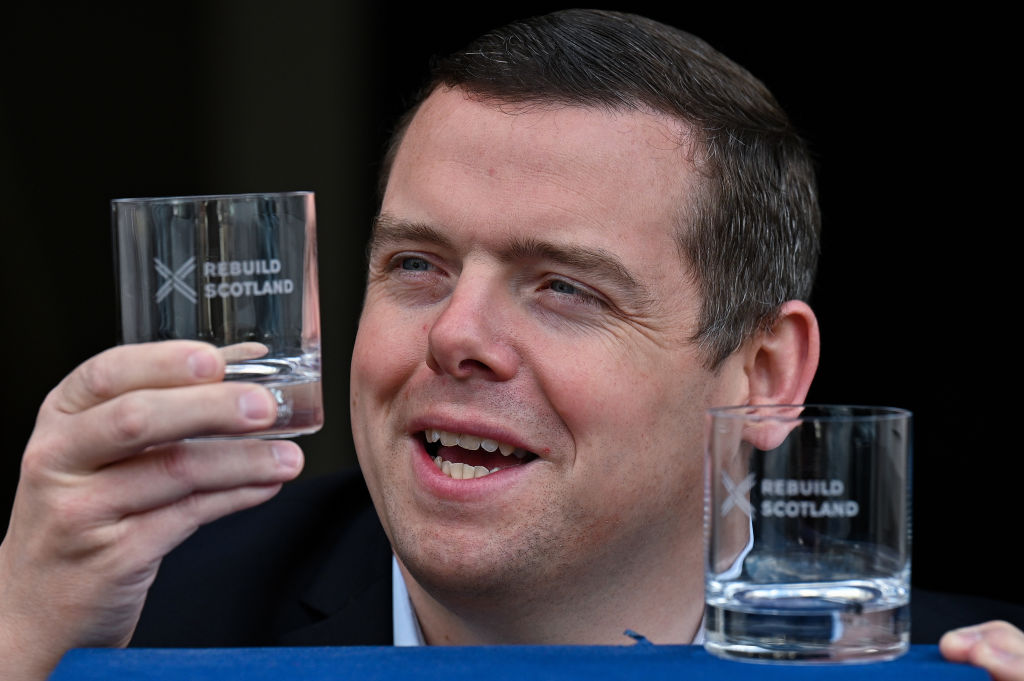Why is the only party of the centre-right in Scotland so far away from government? As the Labour Party becomes more sensible under Sir Keir Starmer and Anas Sarwar, the Scottish Conservatives are facing an increasingly existential threat. Their conference gets underway in Aberdeen this weekend — and the party must not waste this opportunity to confront what is going wrong.
One of the main problems facing Douglas Ross’s Scottish Tories is that his party and the SNP are inextricably linked. Both groups are utterly dependent on the prospect of a second independence referendum being credible and real. Think about it: the SNP’s overarching narrative for the last 10 years has been ‘vote for us and you will have a second independence referendum’. For the Tories, their solitary message has been ‘vote for us and we will stop a second independence referendum’. Both have been successful strategies, because indyref 2 looked plausible — until the Supreme Court ruled that the Scottish Parliament doesn’t have the power to legislate for a referendum on Scottish independence. And now, relaxed by this legal barrier and attracted by the rebirth of Labour, these apparently dedicated Tories have suddenly found themselves falling into the loving arms of Starmer.
This is not a surprise to those of us who have remained semi-detached from the party and unemotional about the reality of its position. In recent years, many Scottish Tory voters were not in fact Conservatives. Instead, they were Unionists, and their relationship with the Scottish Conservative and Unionist Party was a transactional one. They have got what they wanted. The Union is safe — and now they’re off.
Still, things could be worse. As the Scottish Tory party heads into its annual conference, it is gearing up for a general election in which it is almost certain to eclipse the performance of its parent party throughout the rest of Britain. Sitting on six seats, most of which are only moderately impacted by boundary changes, party leader Douglas Ross is highly likely to emerge from the election intact. In fact, it’s not impossible for his party to make small gains and the Scottish Tory leader isn’t afraid to point this out — ‘I think we could have a really good general election,’ Ross told The Spectator in October. So when the rest of the Conservative party inevitably enters a period of deep introspection and probably internecine warfare after what is predicted to be a very unfortunate general election result, Ross will be able to turn around and say: ‘nothing to do with me, guv’.
But this will be a Potemkin triumph. Six, seven, or eight seats is, for the purposes of analysing the long-term health of the party, not really the point. At the general elections of 2017 (over 28 per cent) and 2019 (over 25 per cent) the party commanded a vote share far in excess of anything obtained during the devolution era, and not far off the highs of Margaret Thatcher’s time in office. Current polling, though, has the Tories back in eerily familiar territory, consistently in the high teens and unable to break through the 20 per cent barrier. And the reason this vote share collapse is not expected to lead to a commensurate collapse in seats is because all of the Tory-held constituencies, and all of the Tory targets, are head-to-head races with the SNP, another party which has seen voters leaving in their droves, and which lacks the strength to challenge.
After the post-general election celebrations and back-patting, the penny will drop. The party can mask its problem at a Westminster election based entirely on first-past-the-post where the key battles are with the flailing SNP. But there will be no hiding place 18 months later, at the part-proportional representation elections to the Scottish Parliament.
Of the 31 seats won by Douglas Ross in 2021, matching the achievement of Ruth Davidson in 2016, only five were won in the constituencies. The other 26 were elected through the party list system, based exclusively on vote share, with the party picking up a minimum of two seats in each of the eight Scottish regions. The Tory MSP elected last in each region by the D’Hondt system will, if currently polling is remotely accurate, be out of a job in a couple of years.
This looming disaster will be swept under the blue carpet at the P&J Live Arena this Friday and Saturday. There’s nothing a Scottish Conservative member likes more than a flying visit from an SNP-bashing Prime Minister, and Rishi fever will take over. The members will leave happy and energised, safe in the knowledge that their core objective of defeating Scottish nationalism is going rather well.
It is 22 years since I started working for the then Conservative leader David McLetchie — a man of outstanding intellect and ability who struggled to lift the party’s vote share out of the teens. The core issue is not much different now to what it was then: the only party of the centre-right in Scotland is far, far away from government in Scotland. The Scottish Tories cannot avoid the question for much longer: how do they turn their fortunes around?






Comments